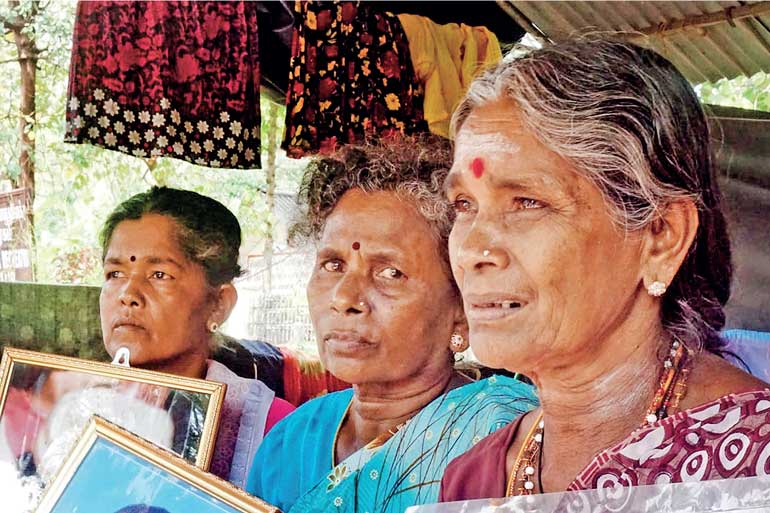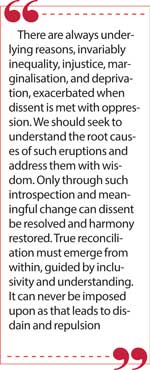Sunday Dec 28, 2025
Sunday Dec 28, 2025
Friday, 6 December 2024 00:22 - - {{hitsCtrl.values.hits}}

They may still feel trapped in the same plight, and unless that perception is acknowledged, addressed, and their aspirations realised, the resurgence of dissent is not merely possible but inevitable
 It is now 15 years since the end of a brutal 30-year conflict. Yet, we remain trapped in a cycle of grief, division, and mistrust. This cannot continue. If we do, we will head down a path to ruin.
It is now 15 years since the end of a brutal 30-year conflict. Yet, we remain trapped in a cycle of grief, division, and mistrust. This cannot continue. If we do, we will head down a path to ruin.
A rare and golden opportunity stands before us now. The recently concluded general elections have sent a powerful message: our communities are ready to rise above the shackles of communal politics and chart a new course toward unity and hope.
Addressing the matter now has profound significance in view of the ‘Maaveerar Naal’ (Great Heroes Day) that fell on 27 November, and comments made by a newly appointed independent MP representing the Jaffna District. Both are related.
Maaveerar Naal commemoration by the Tamil community on the north is two-fold; firstly, remembering those who have died, both civilians and LTTE combatants, during the brutal and long-drawn internecine conflict, and secondly, honouring the militant leader of the struggle, his movement and his demand for a separate state. Whilst the first reason of remembering the dead is fully justified, the second reason of honouring a leader, a movement and a map delineating boundaries of the area of the clamoured independent state is considered illegal as they remain proscribed.
Justification of commemorating the dead requires no contention or debate. There is nothing wrong in the Tamil community wanting to commemorate the LTTE dead as much as the majority community have the right to commemorate their own dead. Even monuments and memorials are perfectly in order. That is part of history. Solemn commemoration ceremonies should be encouraged and even be undertaken jointly with Government patronage. It would become a global model for reconciliation.
A refuge from discrimination
The second reason should be the true focus for analyses due to its profound significance. Why does the Tamil community still revere and honour a proscribed movement for emancipation? The only reasonable inference is that they had confidence in the uprising, a refuge from real or imagined discrimination, a beacon of hope for equality and feel grateful for the sacrifices made to secure an honourable future. Sadly, the lingering perception of inequality, injustice, oppression, marginalisation, and deprivation persists, even after the leader’s death. That is a stark indictment of the failures of successive Governments to fulfil the aspirations of the Tamil community for equality, justice, liberation, inclusivity and opportunity. What is relevant here is how the aggrieved feels not what anyone else says.
Many in the Tamil community may have seen the LTTE leader as a saviour. There is nothing wrong in that with the plight they were in then. They may still feel trapped in the same plight, and unless that perception is acknowledged, addressed, and their aspirations realised, the resurgence of dissent is not merely possible but inevitable, threatening to unleash profound and destabilising consequences. Decentralisation of power including Police powers, use of own language, freedom to practise religious and cultural traditions without any reservation are vital for true autonomy and dignity. That is unity in diversity. In the long term, inclusivity demands that all communities learn both Sinhalese and Tamil, the most widely used languages of the country. How meaningful would it be for the National Anthem to be sung in Tamil!
Sowing seeds of suspicion and hatred
 Yet, there are communal elements seeking to sow seeds of suspicion and hatred, constantly invoking the wounds of our violent past to stir up fear, resentment, division, and assert supremacy. They categorically denounce and condemn Maaveerar Naal in its entirety. Their rhetoric threatens to reignite the very tensions we strive to leave behind.
Yet, there are communal elements seeking to sow seeds of suspicion and hatred, constantly invoking the wounds of our violent past to stir up fear, resentment, division, and assert supremacy. They categorically denounce and condemn Maaveerar Naal in its entirety. Their rhetoric threatens to reignite the very tensions we strive to leave behind.
The fear, resentment and division are stirred citing national security, a convenient excuse to avoid confronting reality. That is a clear sign of denial and cowardice. National security is grounded on assessment of threats known as the ‘threat perception’ and not in manipulation of past fears. Throughout history, Sri Lanka has endured invasions and external threats; from Chola, Kalinga and Magha to the Portuguese, Dutch and the British. Those threats have now receded. We face no imminent external military threat now. The perceived threat now is internal uprisings and strife due to disharmony, disunity and discord leading to dissent and disillusionment. That is the challenge that needs to be addressed.
The only path of ensuring national security is through national harmony, which in turn can only be achieved by reconciling past differences rather than perpetuating division and estrangement or asserting supremacy. The best way is to learn from the great teacher, Lord Buddha, on how he, having realised human frailty and underlying reasons of the fiendish acts of Angulimala, enlightened and transformed him by explaining that “fire cannot be doused by fire but only by water”.
Majority in Sri Lanka are adherents of Lord Buddha. Applicability of such teachings is eternal. Realising that, the majority has to take the lead and display magnanimity now that the chapter of conflict is over. That great teaching leads us to appreciate principles of justice and empathy for all, devoid of asserting supremacy of one community over another. True unity comes from unconditional inclusivity, not exclusivity—a collective effort to embrace diversity and build a shared future.
Underlying reasons
As I have mentioned in my article titled, “Rejection and role morality: Only way out of the abyss” published in Financial Times on 30 August 2024, all violent dissent in Sri Lanka were valid in their own right. (The link to the article is at the end of this article.) There are always underlying reasons, invariably inequality, injustice, marginalisation, and deprivation, exacerbated when dissent is met with oppression. We should seek to understand the root causes of such eruptions and address them with wisdom. Only through such introspection and meaningful change can dissent be resolved and harmony restored. True reconciliation must emerge from within, guided by inclusivity and understanding. It can never be imposed upon as that leads to disdain and repulsion. Inclusivity is a major management tool clearly emphasised in Japanese management principles that is equally applicable within a family, classroom or office.
Deriding the defeated and asserting supremacy is a mark of poor character. True greatness lies in showing magnanimity in victory—a hallmark of a noble and honourable winner. Building edifices to commemorate victory deepens the division as it ridicules the defeated. An erudite Buddhist monk declined the invitation to attend an opening of such an edifice a few years ago citing exactly the same reason. It is said that King Dutugemunu even built a tomb for his adversary demanding utmost respect from passersby. That is a genuine sign of magnanimity in victory!
To weave a vibrant tapestry of unity, the new Government should actively promote inter-community celebrations. By supporting reciprocal visits and joint celebrations for occasions like Vesak, New Year, Ramazan, Haj, Thai Pongal, Deepavali, Christmas, and many others. Events commemorating the dead should also be jointly conducted, and then, we can foster a more inclusive and harmonious society.
If we do it right, I am certain the Tamil and Muslim communities will fight alongside the Sinhalese as Sri Lankans against any threat. Brothers in arms! I yearn for that day!
Link to my previous article:
https://www.ft.lk/opinion/Rejection-and-role-morality-Only-way-out-of-the-abyss/14-766174#goog_rewarded